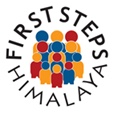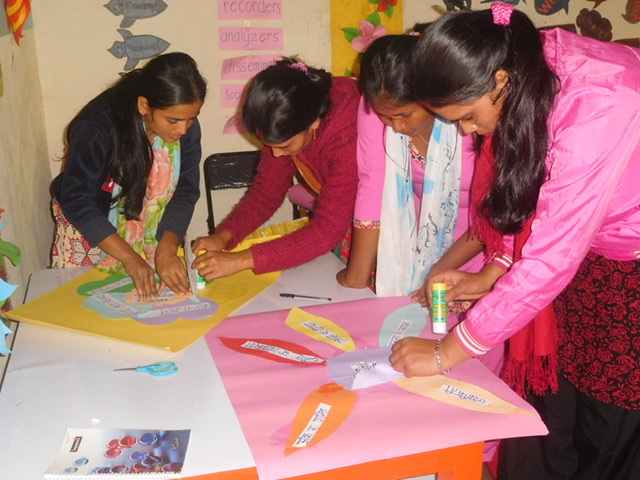
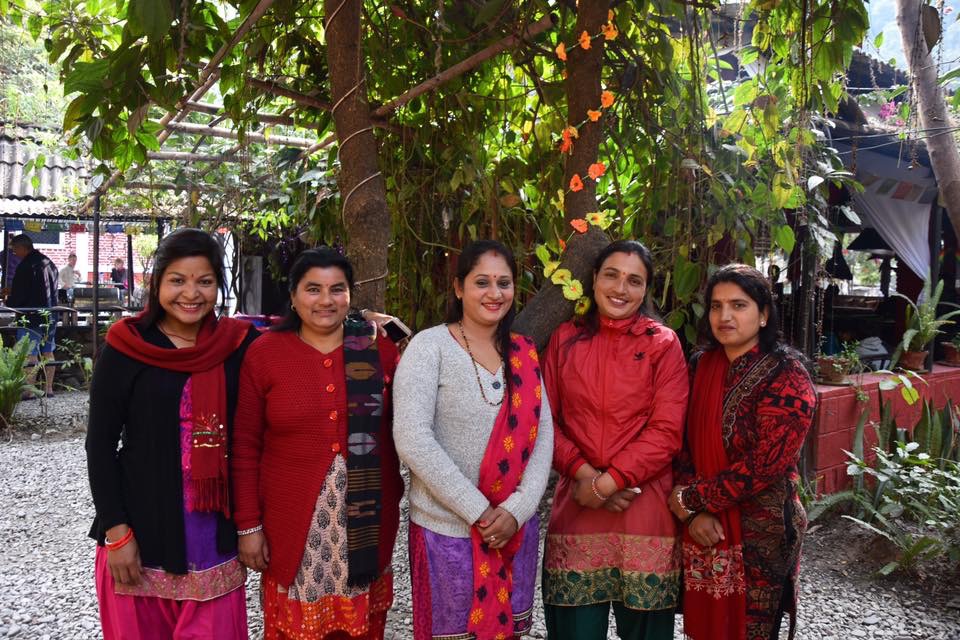
IYH started because of the devastating earthquake in 2015 which hit large areas of Nepal demolishing villages and schools. Our goal was to repair/rebuild 6 schools to keep children safe and off the streets as well as get them back to education as soon as possible.
Why was rebuilding so important ? The simple answer is trafficking. An article by UNICEF highlighted that particularly after natural disasters, innocent families are tricked with the promise of a bright future for their young children who are then trafficked into India by unscrupulous agents, alternatively they just take children from the village streets. Having a school keeps children off the street. Having a good education keeps them safer. This horror was highlight d in an article in The Times of India in 2018 saying that trafficking from Nepal had increased by 500% in the last 5 years.
Why Teacher Training? It became apparent that there was a real need for teachers to have more training and development not only for their own motivation but for the benefit of the children and community who appeared to have little faith in education. We see education as their children’s opportunity to have choices in the future. By investing in teacher training, we hope to influence and inspire the teachers, the children and the community to believe in the power of education too and encourage a lower rate of drop out from primary school to senior school in government schools.
We were advised to help these five schools in particular by our good friends at The Mandala Organisation who are a local NGO and our partners. They are key to delivery of all our strategies. The youngest school students are 3 years old and the oldest are 14.
We have now completed the buildings and we want to explain our updated Teacher Training Strategy. We have completed some pilot training and have now partnered with First Steps, a New Zealand Charity with a base in Sindopalchuk, Nepal. This is the same region where 4 of the schools we support are based. They have run several 5 day residential courses for the teachers. It has been a resounding success and we will continue this partnership as they are local experts with excellent facilities and trainers.
In 2019/20 we delivered two computer training courses for teachers from each school to be delivered over 4 days. This was a pilot scheme. It went really well and was well received. We have started to invest in computers for each school with built in teacher resources. No WiFi would be required to use these resources.
in 2023 it was apparent that the maintenance of computers was challenging and limited in terms of supporting teaching. We have decided to focus on Teacher Training.
Here is our plan for the teachers at the five schools we support.
IYH PLAN FOR 2019-2025
Our plan is to work with First Steps to deliver the first three items on this list:
- two residential courses each year lasting five days each time. One in April and one in November.
- On-going supervisory and mentor program at their own schools with a visiting trainer.
I am taking the liberty of quoting directly from the First Steps website to explain why Teacher Training is important and why we are working with them. They have been operating for over 10 years in this area so we are happy to listen and learn from their expertise for the benefit of the schools we support.
“WHY TEACHERS NEED TRAINING
Children in rural Nepal are disadvantaged right from birth. This is due to poor nutrition, immature motherhood and lack of parental awareness of early childhood development. Child rearing practices in Nepal traditionally do not involve any stimulation or play based learning. Young children are often left hanging in baskets whilst their mothers work in the fields. Crawling toddlers are frequently left locked in the house alone. In fact, most children over two years are left by themselves during the day to wander around. Older children may have to stay at home to look after younger siblings or work in the fields. Lack of early childhood education means that children enter school without adequate preparation and delayed development.
Furthermore, the majority of schools in rural Nepal are inadequately resourced and children often have to sit on dirty floors without a teacher. Teachers are poorly trained and lack motivation resulting in a high level of teacher absenteeism, poor teaching and children who receive ineffective education. The consequence is poor ability in class, failed exams and children dropping out of school, thus perpetuating a continuous cycle of a low level of education and poverty.
OUR SOLUTION
TO IMPROVE THE QUALITY OF EARLY YEARS EDUCATION IN NEPAL, WE CREATE STIMULATING LEARNING ENVIRONMENTS, RUN BY TRAINED AND ENTHUSIASTIC TEACHERS.
Through play, children develop a love of learning, understand concepts better, learn strategies and gain social & communication skills. Children who attend our early childhood centres tend to learn to read and write more quickly, have longer attention spans and can problem solve far better than children who have not attended. These are life skills that will benefit them throughout their lives, and that they can pass on to their own children.
Our primary school projects extend the play based learning concepts into early years school education. Teachers are trained in child friendly teaching methods, learn to create their own resources and supplement the curriculum with stimulating activities. They learn to improve classroom management and how to foster a love of learning in children.
In order for teachers to transfer their newly developed skills from our training to the classroom a quality learning environment is critical. Teacher training and a supportive environment work hand in hand. We refurbish classrooms and provide resources to create a safe and stimulating learning environment that is suited to the local culture and will support higher quality teaching. Classrooms move from dirt floors to carpet, from sitting on wooden pallets to desks, from chalk boards to access to crayons, paper and books.
When a school fully participates in our programme, the results can be remarkable. Classrooms are clean and tidy, resources are cared for and the children enjoy their lessons. As a result attendance improves and the school runs more smoothly.
“Our early childhood and school support projects are the first steps to bringing about long term change for the children of rural Nepal.”
TRAINING AND IMPROVEMENT IN TEACHING STANDARDS ARE THE KEY TO BRINGING ABOUT POSITIVE CHANGE IN RURAL HIMALAYAN SCHOOLS”
Our experienced teacher trainers
We invest in training local teachers in modern professional teaching methods, appropriate to the children and their culture. Teachers use both Nepali and English in their classes, with locally produced educational materials. Teachers joining our programme come to our training centre in Sangachok, and learn side by side in a real classroom environment with our staff and teacher trainers. They then return to their own classrooms and continue their professional development through an ongoing supervisory and mentoring programme.
Our training programme has been carefully designed by our education team, to ensure it is culturally appropriate for success in rural village schools.
Training is aimed at increasing teachers ability to convey ideas in clear and convincing ways, to create effective learning environments for children and to foster productive teacher-student relationships. We seek to improve teachers skills, motivation, enthusiasm and creativity.
Following initial training, we provide refresher workshops which are essential to ensure long term success.”
Www.firststepshimalaya.org
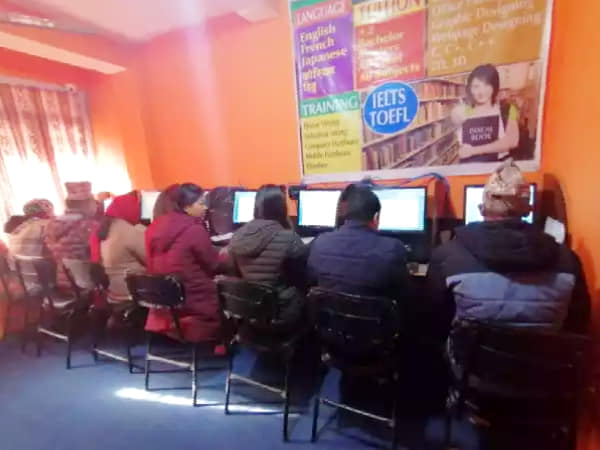
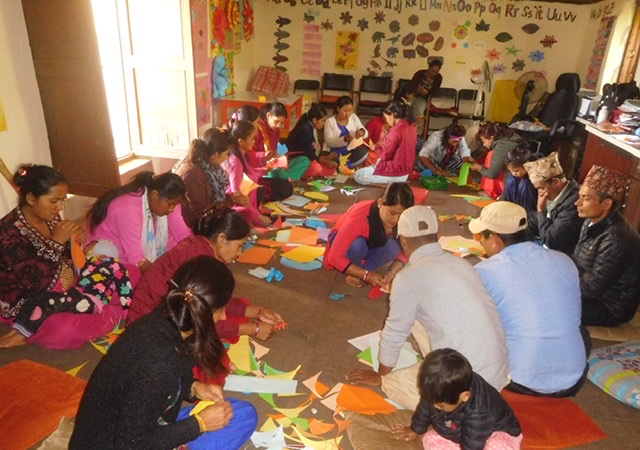
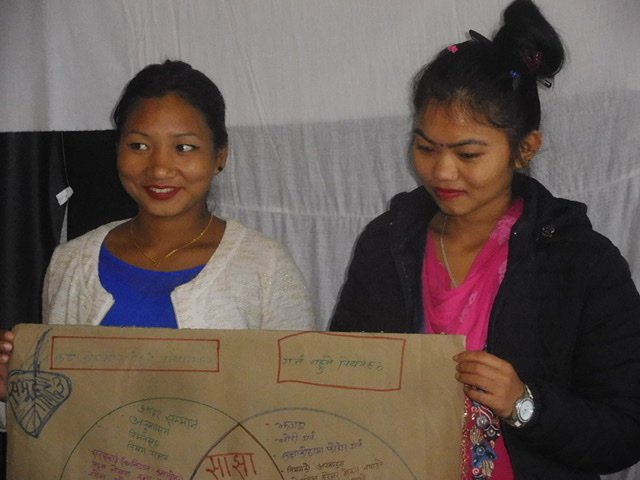
Website crafted by Grafika
